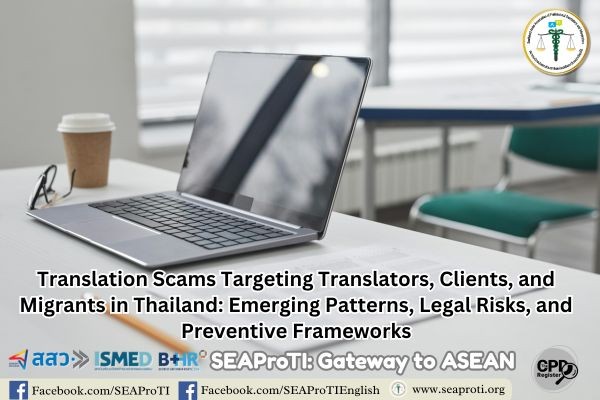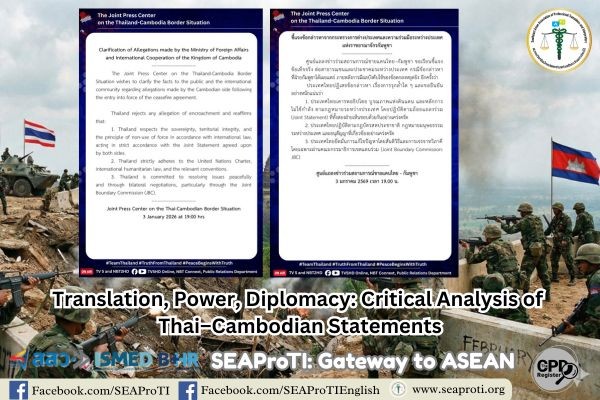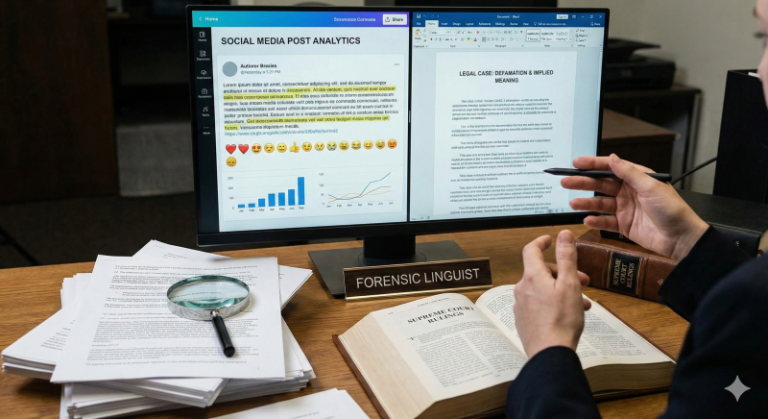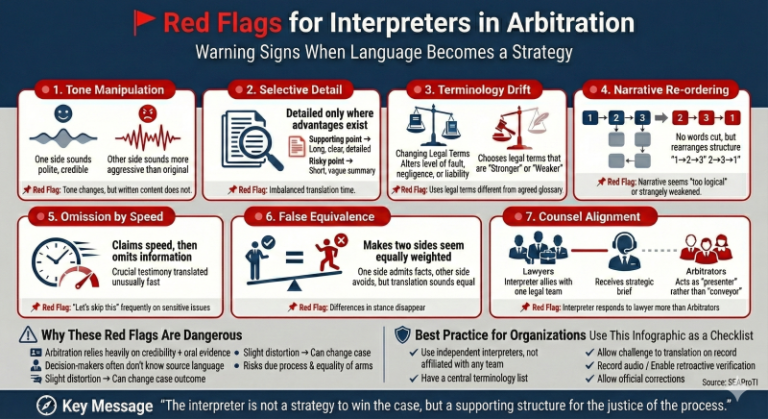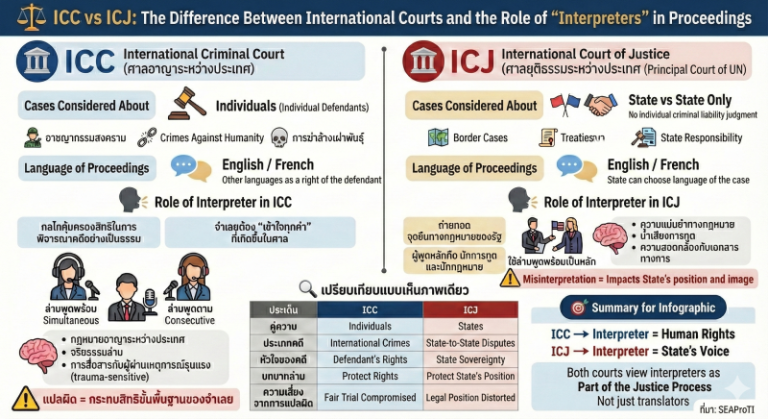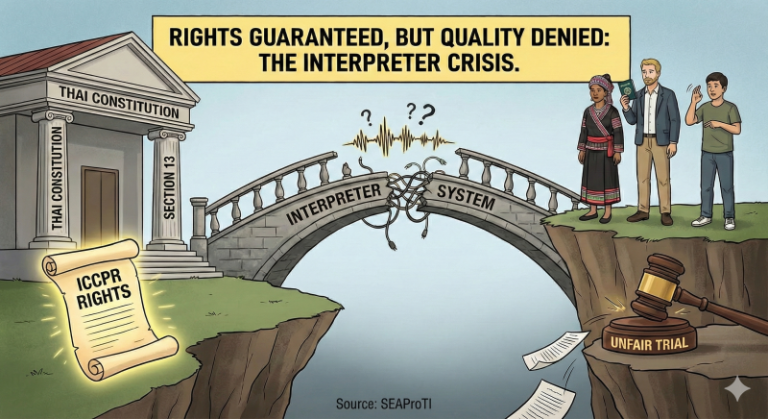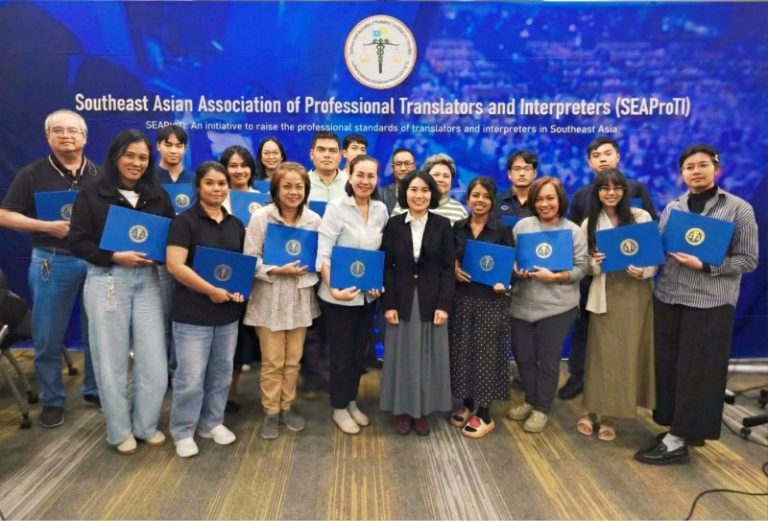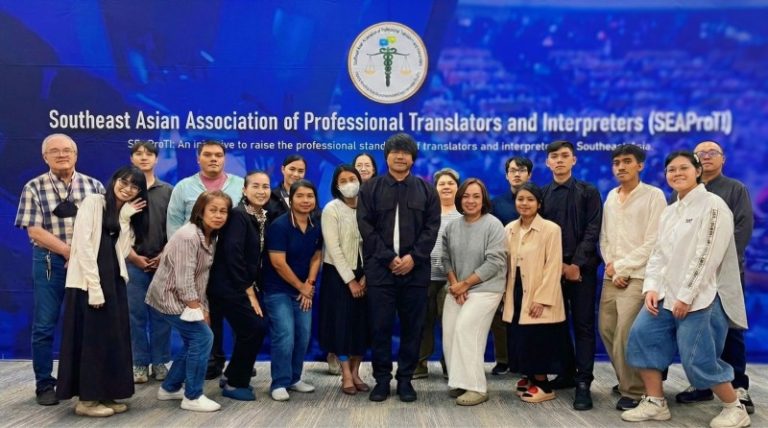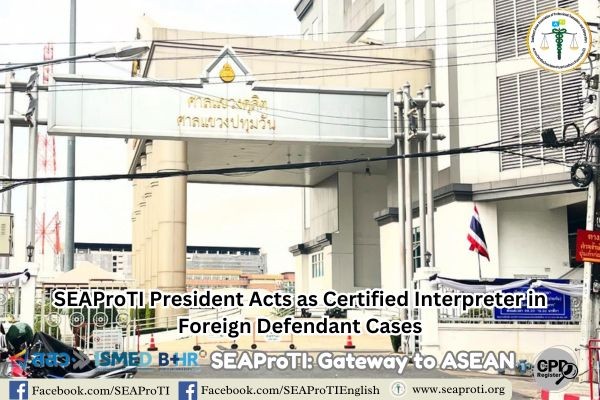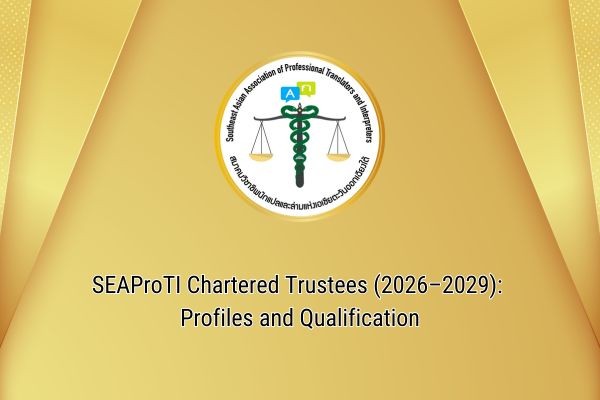Translation Scams Targeting Translators, Clients, and Migrants in Thailand:
Emerging Patterns, Legal Risks, and Preventive Frameworks
19 October 2025, Bangkok – This paper examines the growing phenomenon of translation-related scams in Thailand, which exploit both the linguistic profession and vulnerable communities such as migrant workers. It identifies major scam typologies — including fake translation agencies, identity hijacking, overpayment fraud, AI-based impersonation, and coercive job recruitment — and analyzes their intersection with Thailand’s digital economy, cybercrime trends, and regulatory frameworks. The study concludes with preventive recommendations for translators, clients, and policymakers emphasizing verification, professional licensing, and awareness under ethical and legal standards.
1. Introduction
The translation industry in Thailand, like many sectors transitioning into the digital era, faces increasing exposure to online fraud and cybercrime. Scams that target translators and clients not only cause financial loss but also erode professional integrity and public trust (International Federation of Translators [FIT], 2023). As technology enables impersonation and rapid cross-border transactions, fraudulent activities now extend to the misuse of certified translation credentials, AI voice cloning, and coercive labor recruitment. This study analyzes the characteristics of these scams and their implications within Thailand’s legal and professional frameworks.
2. Common Scam Patterns
2.1 Fake Agencies and Impersonation
Fake translation agencies or recruiters frequently operate via free email domains and social messaging applications such as WhatsApp and Telegram. They imitate legitimate language service providers (LSPs) using look-alike domains or logos, offering unrealistically high compensation and urgent project deadlines (SEAProTI, 2024). These tactics aim to bypass platform protections and obtain personal or financial data.
2.2 Overpayment and Refund Fraud
Fraudulent “clients” often send fake or excessive payments and demand partial refunds before the original transfer is reversed. This scam commonly exploits the trust dynamics in freelance translation marketplaces (Interpol, 2023). Victims suffer both financial loss and reputational damage, as scammers may use falsified payment proofs to claim legitimacy.
2.3 Identity Hijacking
A particularly harmful scheme involves the theft of real translators’ profiles and credentials — including LinkedIn data and CVs — to deceive Thai SMEs or migrants needing certified translations. Once prepayments are received via PromptPay or Thai bank transfers, scammers vanish, leaving clients defrauded and translators’ reputations tarnished (SEAProTI, 2025).
2.4 AI-Assisted Impersonation
Recent reports indicate a rise in scams using artificial intelligence for voice cloning and text synthesis. Scammers can mimic project managers or officials, pressuring linguists to make payments for “verification” or “legalization” (National Cyber Security Agency [NCSA], 2025). Such impersonation has become a high-risk vector for fraud in professional correspondence.
3. Thailand-Specific Risk Vectors
3.1 Fraudulent “Certified Translation” Services
In Thailand, translation scams often exploit the regulatory ambiguity surrounding “certified translation” and legalization processes. Fake agencies advertise “guaranteed” visa approvals and offer government-linked packages at abnormally low rates, misleading consumers into believing that translations can influence legal outcomes (Department of Consular Affairs, 2024).
3.2 Trafficking Through Fake Interpreter Jobs
Cases have emerged where so-called “Thai–Chinese interpreter” positions or online translation jobs serve as fronts for human trafficking into scam compounds in neighboring countries such as Cambodia and Myanmar. Victims have been detained and coerced to assist in online fraud operations (United Nations Office on Drugs and Crime [UNODC], 2024).
3.3 Money-Mule Exposure
Some translators have been approached to act as intermediaries for financial transactions under the guise of facilitating payments from foreign clients. Such involvement can expose individuals to prosecution under Thailand’s Anti-Money Laundering Act B.E. 2542 (1999), as amended, particularly when cryptocurrency or cross-border remittance is involved (Anti-Money Laundering Office [AMLO], 2025).
4. Indicators and Red Flags
Professionals should remain alert to the following indicators:
- Non-corporate or inconsistent email addresses and signatures.
- Immediate requests to move communication off secure platforms.
- Unusually high rates, urgent payments, or upfront fees labeled as “verification” or “expedite” costs.
- Spoofed government branding or newly registered websites lacking traceable Thai business registration.
These red flags correspond to common patterns identified in cybercrime advisories by the Thai Royal Police and the Ministry of Digital Economy and Society (2025).
5. Verification and Response Measures
5.1 Due Diligence
Translators and clients should verify company identities through Thailand’s Department of Business Development registry, confirm staff emails, and validate tax information before engagement. Certified translations should only be handled by individuals recognized by accredited professional bodies such as SEAProTI or associations endorsed by the Ministry of Foreign Affairs.
5.2 Contractual Safeguards
Engagements should specify scope, payment milestones, and escrow mechanisms on reputable platforms. Translators must avoid handling client funds, cryptocurrencies, or intermediary remittances that may trigger money-laundering liability (AMLO, 2025).
5.3 Reporting Mechanisms
Victims should document evidence and report through official portals such as thaipoliceonline.com, the 1441 Cybercrime Hotline, or consumer complaint channels. In trafficking-related cases, immediate contact with NGOs and UN-affiliated assistance networks is recommended (UNODC, 2024).
6. Legal and Ethical Considerations
Misrepresentation in document translation can amount to fraud or forgery under the Thai Penal Code, Sections 264–268. Translators who falsely certify accuracy or participate in forged document chains risk criminal penalties and professional sanctions (Criminal Code, B.E. 2499). Ethical compliance, therefore, requires transparent documentation, client verification, and refusal of suspicious or coercive requests.
The SEAProTI Code of Professional Conduct (2024) mandates impartiality, accuracy, and avoidance of financial entanglement — principles consistent with international ethical standards such as those of the International Association of Conference Interpreters (AIIC, 2023).
7. Conclusion
Translation scams in Thailand reflect the convergence of linguistic trust, digital deception, and regulatory gaps. The combination of AI impersonation, identity theft, and fraudulent certification schemes threatens both professional integrity and national cyber resilience. Preventive strategies should integrate professional licensing, cross-sectoral verification, and awareness campaigns targeting translators, clients, and migrant communities.
Ultimately, safeguarding linguistic professions from criminal exploitation is essential not only for protecting economic interests but also for maintaining justice, trust, and ethical governance in Thailand’s translation ecosystem.
References
- Anti-Money Laundering Office (AMLO). (2025). Guidelines on financial crime prevention in digital services. Bangkok: Ministry of Finance.
- Association Internationale des Interprètes de Conférence (AIIC). (2023). Code of professional ethics. Geneva: AIIC Publications.
- Department of Consular Affairs. (2024). Public warning on fraudulent legalization and translation services. Ministry of Foreign Affairs of Thailand.
- FIT. (2023). Translators’ rights and responsibilities in the digital era. International Federation of Translators Policy Paper.
- Interpol. (2023). Cyber-enabled fraud and overpayment scams: Global threat assessment. Lyon: Interpol Publications.
- Ministry of Digital Economy and Society. (2025). Thailand cybercrime and consumer protection bulletin. Government of Thailand.
- National Cyber Security Agency (NCSA). (2025). Advisory on AI voice fraud and digital impersonation. Bangkok: Ministry of Digital Economy and Society.
- SEAProTI. (2024). Professional conduct and verification protocol for certified translators and interpreters. Southeast Asian Association of Professional Translators and Interpreters.
- SEAProTI. (2025). Annual report on translation ethics and fraud prevention in Thailand. Bangkok: SEAProTI Secretariat.
- United Nations Office on Drugs and Crime (UNODC). (2024). Trafficking in persons for forced criminality: Southeast Asia update. Vienna: United Nations.
About Certified Translators, Translation Certifiers, and Certified Interpreters of SEAProTI
The Southeast Asian Association of Professional Translators and Interpreters (SEAProTI) has formally announced the qualifications and requirements for registration of Certified Translators, Translation Certification Providers, and Certified Interpreters in Sections 9 and 10 of the Royal Gazette, published by the Secretariat of the Cabinet, Office of the Prime Minister of Thailand, on 25 July 2024 (Vol. 141, Part 66 Ng, p. 100). Certified Translators, Translation Certification Providers, and Certified Interpreters
The Council of State has proposed the enactment of a Royal Decree, granting registered translators and recognized translation certifiers from professional associations or accredited language institutions the authority to provide legally valid translation certification (Letter to SEAProTI dated April 28, 2025)
SEAProTI is the first professional association in Thailand and Southeast Asia to implement a comprehensive certification system for translators, certifiers, and interpreters.
Head Office: Baan Ratchakru Building, No. 33, Room 402, Soi Phahonyothin 5, Phahonyothin Road, Phaya Thai District, Bangkok 10400, Thailand
Email: hello@seaproti.com | Tel.: (+66) 2-114-3128 (Office hours: Mon–Fri, 09:00–17:00)
การหลอกลวงในงานแปลในประเทศไทย:
รูปแบบ กลยุทธ์ทางกฎหมาย และแนวทางป้องกันสำหรับนักแปล ลูกค้า และแรงงานข้ามชาติ
19 ตุลาคม 2568, กรุงเทพมหานคร – บทความนี้วิเคราะห์รูปแบบการหลอกลวงที่เกิดขึ้นในแวดวงการแปลของประเทศไทย ซึ่งส่งผลกระทบต่อทั้งนักแปล ลูกค้า และแรงงานข้ามชาติ โดยเฉพาะในยุคดิจิทัลที่เทคโนโลยีเอื้อให้เกิดการปลอมแปลงและแอบอ้างตัวตนได้ง่ายขึ้น การหลอกลวงมักอยู่ในรูปของ “บริษัทแปลปลอม” การขโมยข้อมูลส่วนตัวของนักแปลจริง การโอนเงินเกินยอดและขอคืนบางส่วน การปลอมแปลงเสียงหรืออีเมลด้วยเทคโนโลยี AI รวมถึงการหลอกลวงให้รับงานล่ามที่นำไปสู่การค้ามนุษย์ข้ามพรมแดน บทความนี้ชี้ให้เห็นปัจจัยเสี่ยงเฉพาะของประเทศไทย และเสนอแนวทางป้องกันทั้งในระดับบุคคลและสถาบัน เพื่อเสริมสร้างจริยธรรมและความปลอดภัยในวิชาชีพการแปล
1. บทนำ
อุตสาหกรรมการแปลในประเทศไทยกำลังเผชิญความท้าทายใหม่จากการหลอกลวงทางไซเบอร์ที่มีความซับซ้อนมากขึ้น ผู้กระทำมิจฉาชีพมักใช้เทคโนโลยีเพื่อปลอมแปลงเอกลักษณ์ของนักแปลหรือหน่วยงาน เพื่อหลอกลวงทั้งนักแปลมืออาชีพและลูกค้าทั่วไป (International Federation of Translators [FIT], 2023) ปรากฏการณ์นี้ไม่เพียงสร้างความเสียหายทางเศรษฐกิจ แต่ยังบั่นทอนความน่าเชื่อถือของวิชาชีพ โดยเฉพาะอย่างยิ่งในกลุ่มนักแปลที่ให้บริการด้านเอกสารราชการหรือเอกสารทางกฎหมาย ซึ่งอาจมีผลผูกพันทางกฎหมายโดยตรง
2. รูปแบบการหลอกลวงที่พบบ่อย
2.1 บริษัทหรือผู้ว่าจ้างปลอม
มิจฉาชีพใช้ชื่อและโลโก้ของบริษัทแปลที่มีชื่อเสียง โดยสร้างอีเมลปลอมและเว็บไซต์เลียนแบบ เสนอค่าจ้างสูงกว่าปกติและเร่งรัดเวลาในการทำงาน (SEAProTI, 2024) จากนั้นจะโน้มน้าวให้นักแปลย้ายการสื่อสารไปยังแอปพลิเคชันอย่าง WhatsApp หรือ Telegram เพื่อหลีกเลี่ยงการตรวจสอบจากแพลตฟอร์มกลาง
2.2 การโอนเงินเกินยอดและการขอคืนบางส่วน
กลโกงลักษณะนี้เกิดจาก “ลูกค้าปลอม” ที่ส่งหลักฐานโอนเงินเกินยอดงาน แล้วอ้างว่าเป็นความผิดพลาดและขอคืนเงินบางส่วนก่อนที่ระบบจะตีกลับ ธุรกรรมปลอมลักษณะนี้พบได้บ่อยในตลาดฟรีแลนซ์ระหว่างประเทศ (Interpol, 2023)
2.3 การขโมยตัวตนของนักแปลจริง
อาชญากรไซเบอร์นำข้อมูลส่วนตัวของนักแปลที่มีชื่อเสียง เช่น เรซูเม่ โปรไฟล์ LinkedIn หรือใบรับรอง มาหลอกขายบริการแก่ลูกค้าชาวไทย โดยเฉพาะผู้ประกอบการ SMEs หรือแรงงานที่ต้องการแปลเอกสารรับรอง จากนั้นหายตัวไปหลังได้รับเงินผ่าน PromptPay หรือบัญชีธนาคาร (SEAProTI, 2025)
2.4 การปลอมแปลงด้วยเทคโนโลยี AI
เทคโนโลยีการสังเคราะห์เสียงและอีเมลด้วยปัญญาประดิษฐ์ถูกนำมาใช้เพื่อแอบอ้างเป็นผู้จัดการโครงการหรือเจ้าหน้าที่หน่วยงานรัฐ หลอกให้นักแปลรีบโอนเงินเพื่อ “ยืนยันเอกสาร” หรือ “เร่งรับรองผลการแปล” (National Cyber Security Agency [NCSA], 2025) ซึ่งเป็นแนวโน้มที่กำลังเพิ่มขึ้นในประเทศไทย
3. ความเสี่ยงเฉพาะของประเทศไทย
3.1 การหลอกลวงภายใต้ชื่อ “งานแปลรับรอง”
หลายกรณีมีการใช้คำว่า “แปลเอกสารรับรอง” หรือ “บริการยื่นวีซ่าแบบการันตีผล” โดยอ้างอิงหน่วยงานราชการปลอม เว็บไซต์ดังกล่าวมักใช้สัญลักษณ์คล้ายของจริง เพื่อหลอกให้ลูกค้าหลงเชื่อว่าการแปลสามารถทำให้ได้รับการอนุมัติจากทางการ (Department of Consular Affairs, 2024)
3.2 การหลอกลวงให้ไปทำงานล่ามในต่างประเทศ
มีรายงานว่าผู้สมัครงานตำแหน่ง “ล่ามไทย–จีน” ถูกล่อลวงไปยังประเทศเพื่อนบ้าน เช่น กัมพูชาและเมียนมา เพื่อทำงานใน “ค่ายหลอกลวงออนไลน์” (United Nations Office on Drugs and Crime [UNODC], 2024) ผู้เสียหายบางรายถูกกักขังและบังคับให้ช่วยทำธุรกรรมหลอกลวงผู้อื่น
3.3 การถูกใช้เป็นตัวกลางฟอกเงิน
นักแปลบางรายถูกชักชวนให้รับเงินจาก “ลูกค้าต่างชาติ” เพื่อโอนต่อให้บุคคลอื่น โดยอ้างว่าเป็นค่าจ้างงานหรือค่าคอมมิชชั่น การกระทำเช่นนี้อาจเข้าข่ายความผิดฐานฟอกเงินตาม พระราชบัญญัติป้องกันและปราบปรามการฟอกเงิน พ.ศ. 2542 (Anti-Money Laundering Office [AMLO], 2025)
4. สัญญาณเตือนที่ควรระวัง
- ใช้อีเมลส่วนตัว เช่น Gmail หรือ Hotmail แทนโดเมนบริษัท
- รีบเร่งให้ย้ายการสื่อสารไปยังแอปที่เข้ารหัส
- เสนอค่าจ้างสูงผิดปกติหรือขอให้ชำระเงินล่วงหน้าเพื่อ “ยืนยันตัวตน”
- ใช้โลโก้หน่วยงานรัฐปลอม หรือเว็บไซต์ที่จดทะเบียนใหม่ไม่นาน
(อ้างจากรายงานของกระทรวงดิจิทัลเพื่อเศรษฐกิจและสังคม, 2025)
5. แนวทางตรวจสอบและตอบสนอง
5.1 การตรวจสอบก่อนตกลงงาน
นักแปลควรตรวจสอบชื่อบริษัทผ่านฐานข้อมูลกรมพัฒนาธุรกิจการค้า ตรวจสอบหมายเลขโทรศัพท์ สถานที่ตั้ง และรูปแบบอีเมลของพนักงาน รวมถึงตรวจสอบสถานะ “นักแปลรับรอง” กับสมาคมวิชาชีพหรือหน่วยงานที่เกี่ยวข้อง เช่น SEAProTI และกระทรวงการต่างประเทศ
5.2 การทำสัญญาอย่างปลอดภัย
ควรกำหนดขอบเขตงาน เงื่อนไขการจ่ายเงิน และกลไกการคุ้มครอง เช่น ระบบเอสโครว์ (Escrow) ในแพลตฟอร์มที่เชื่อถือได้ ห้ามรับโอนหรือโอนเงินแทนลูกค้าไม่ว่ากรณีใด (AMLO, 2025)
5.3 การรายงานเหตุ
หากตกเป็นเหยื่อ ควรเก็บหลักฐานทั้งหมด เช่น สลิปการโอน อีเมล หรือแชต และรายงานไปยัง
- เว็บไซต์ thaipoliceonline.com
- สายด่วนไซเบอร์ 1441
- สำนักงานคณะกรรมการคุ้มครองผู้บริโภค (สายด่วน 1166)
- และหากมีลักษณะการค้ามนุษย์ให้รีบติดต่อองค์กร NGO หรือเครือข่ายของ UN ที่ให้ความช่วยเหลือเหยื่อ (UNODC, 2024)
6. ประเด็นทางกฎหมายและจริยธรรม
การแปลหรือรับรองข้อความเท็จอาจเข้าข่าย ความผิดฐานปลอมเอกสาร ตามประมวลกฎหมายอาญา มาตรา 264–268 ผู้แปลที่แอบอ้างสถานะ “ผู้รับรองการแปล” โดยไม่มีสิทธิตามกฎหมาย อาจถูกดำเนินคดีอาญาและทางวินัย (Criminal Code, B.E. 2499)
ทั้งนี้ จรรยาบรรณวิชาชีพของ SEAProTI (2024) กำหนดให้นักแปลต้องรักษาความถูกต้อง ความเป็นกลาง และไม่เกี่ยวข้องกับธุรกรรมทางการเงินของลูกค้า เพื่อป้องกันความเสี่ยงทางกฎหมายและจริยธรรมในวิชาชีพ
7. บทสรุป
การหลอกลวงในงานแปลสะท้อนให้เห็นถึงการบรรจบกันของ “ความไว้วางใจทางภาษา” และ “อาชญากรรมดิจิทัล” ในสังคมไทย การใช้เทคโนโลยีเพื่อหลอกลวงและแอบอ้างกำลังท้าทายโครงสร้างความเชื่อมั่นในวิชาชีพอย่างรุนแรง
ดังนั้น การป้องกันต้องอาศัยกลไกร่วมกันระหว่างภาครัฐ สมาคมวิชาชีพ และผู้ให้บริการแปลเอง โดยเน้นระบบ ตรวจสอบตัวตน การอนุญาตวิชาชีพ และการให้ความรู้ด้านความปลอดภัยดิจิทัล แก่นักแปลรุ่นใหม่ เพื่อคงไว้ซึ่งมาตรฐานความน่าเชื่อถือและคุณธรรมในวิชาชีพการแปลของประเทศไทย
บรรณานุกรม
- Anti-Money Laundering Office (AMLO). (2025). Guidelines on financial crime prevention in digital services. Bangkok: Ministry of Finance.
- Association Internationale des Interprètes de Conférence (AIIC). (2023). Code of professional ethics. Geneva: AIIC Publications.
- Department of Consular Affairs. (2024). Public warning on fraudulent legalization and translation services. Ministry of Foreign Affairs of Thailand.
- FIT. (2023). Translators’ rights and responsibilities in the digital era. International Federation of Translators Policy Paper.
- Interpol. (2023). Cyber-enabled fraud and overpayment scams: Global threat assessment. Lyon: Interpol Publications.
- Ministry of Digital Economy and Society. (2025). Thailand cybercrime and consumer protection bulletin. Government of Thailand.
- National Cyber Security Agency (NCSA). (2025). Advisory on AI voice fraud and digital impersonation. Bangkok: Ministry of Digital Economy and Society.
- SEAProTI. (2024). Professional conduct and verification protocol for certified translators and interpreters. Southeast Asian Association of Professional Translators and Interpreters.
- SEAProTI. (2025). Annual report on translation ethics and fraud prevention in Thailand. Bangkok: SEAProTI Secretariat.
- United Nations Office on Drugs and Crime (UNODC). (2024). Trafficking in persons for forced criminality: Southeast Asia update. Vienna: United Nations.
สมาคมวิชาชีพนักแปลและล่ามแห่งเอเชียตะวันออกเฉียงใต้ (SEAProTI) ได้ประกาศหลักเกณฑ์และคุณสมบัติผู้ที่ขึ้นทะเบียนเป็น “นักแปลรับรอง (Certified Translators) และผู้รับรองการแปล (Translation Certification Providers) และล่ามรับรอง (Certified Interpreters)” ของสมาคม หมวดที่ 9 และหมวดที่ 10 ในราชกิจจานุเบกษา ของสำนักเลขาธิการคณะรัฐมนตรี ในสำนักนายกรัฐมนตรี แห่งราชอาณาจักรไทย ลงวันที่ 25 ก.ค. 2567 เล่มที่ 141 ตอนที่ 66 ง หน้า 100 อ่านฉบับเต็มได้ที่: นักแปลรับรอง ผู้รับรองการแปล และล่ามรับรอง
สำนักคณะกรรมการกฤษฎีกาเสนอให้ตราเป็นพระราชกฤษฎีกา โดยกำหนดให้นักแปลที่ขึ้นทะเบียน รวมถึงผู้รับรองการแปลจากสมาคมวิชาชีพหรือสถาบันสอนภาษาที่มีการอบรมและขึ้นทะเบียน สามารถรับรองคำแปลได้ (จดหมายถึงสมาคม SEAProTI ลงวันที่ 28 เม.ย. 2568)
สมาคมวิชาชีพนักแปลและล่ามแห่งเอเชียตะวันออกเฉียงใต้ เป็นสมาคมวิชาชีพแห่งแรกในประเทศไทยและภูมิภาคเอเชียตะวันออกเฉียงใต้ที่มีระบบรับรองนักแปลรับรอง ผู้รับรองการแปล และล่ามรับรอง
สำนักงานใหญ่: อาคารบ้านราชครู เลขที่ 33 ห้อง 402 ซอยพหลโยธิน 5 ถนนพหลโยธิน แขวงพญาไท เขตพญาไท กรุงเทพมหานคร 10400 ประเทศไทย
อีเมล: hello@seaproti.com โทรศัพท์: (+66) 2-114-3128 (เวลาทำการ: วันจันทร์–วันศุกร์ เวลา 09.00–17.00 น.)


